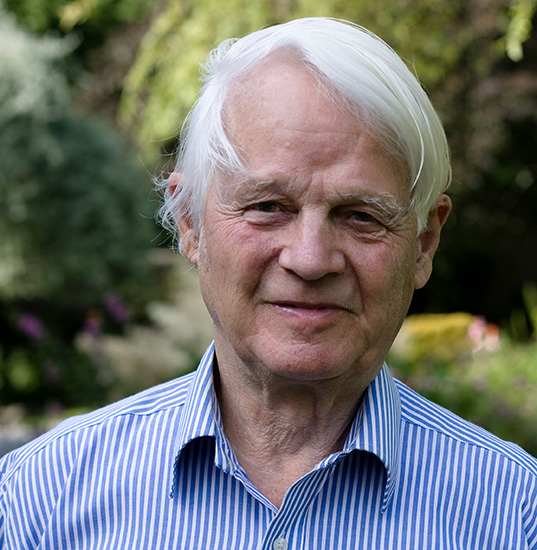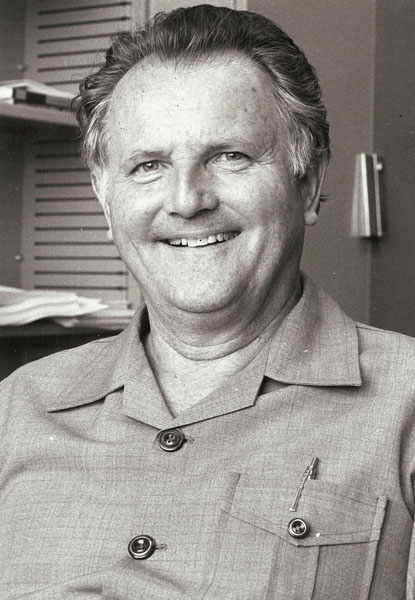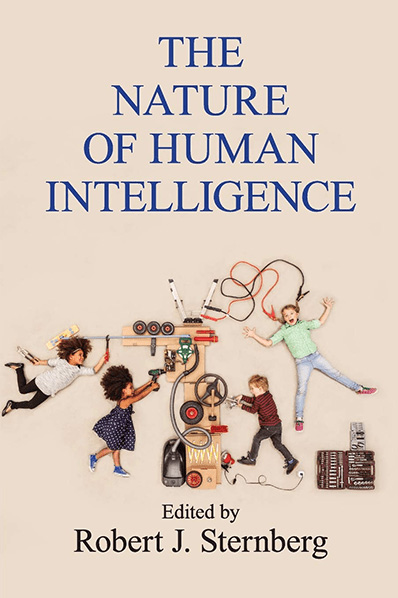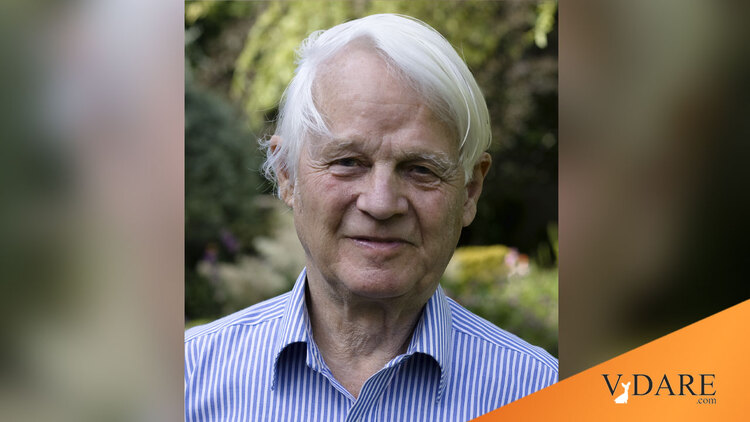Yesterday, I was grieved to learn of the death on July 17 of the great psychologist Richard Lynn. I was also shocked. It should never be a shock when a 93-year-old man dies, but Richard seemed indestructible. He was writing books in his 90s, and just this spring we exchanged email, but not even Richard Lynn was immortal. He leaves behind an immense body of work, a host of friends and admirers, his wonderful wife and helpmeet Joyce, and many children, grandchildren, and great grandchildren.
Richard is, of course, best known for IQ studies. He was fascinated by IQ differences not just between individuals, but between groups, regions, nations, races, and the sexes. Probably no one since Francis Galton has looked more deeply into the causes and consequences of the unequal distribution of intelligence. Like Galton, Richard feared for the future of our species if people of low intelligence and bad character continued to outbreed people of high intelligence and good character.

Professor Richard Lynn
I do not believe Richard ever presented a finding or published an opinion that was not anathema to the orthodox, and this won him torrents of criticism. If the Southern Poverty Law Center can be believed — and in this case perhaps it can be — Leon Kamin of Harvard reportedly accused him of “truly venomous racism, combined with the scandalous disregard for scientific objectivity.” That about sums up the conventional view.
Richard Lynn was born in 1930 in Hampstead, England. His father was a distinguished plant breeder and geneticist who wrote for scientific journals. His father understood that genetics apply also to humans and was one of the signatories of The Geneticists’ Manifesto drawn up by Hermann Muller in 1939, which asked, “How could the world’s population be improved genetically?”
Richard attended Cambridge, where he earned bachelor’s, master’s, and doctorate degrees in psychology. By the late 1960s, he was already wondering why certain groups seemed to build better societies than others, and was impressed by Arthur Jensen’s famous 1969 Harvard Educational Review paper on black-white IQ differences. Richard’s views were also influenced by Hans Eysenck and even by Sir Cyril Burt, though their first meeting was intimidating: Burt was an examiner in Richard’s defense of his Ph.D.

Arthur Jensen
In the 1970s, the “Japanese economic miracle” astonished the world, and Richard wondered what could be behind it. He used culture-free tests and was the first to report that the average Japanese IQ was higher than the average European IQ — perhaps 104 or 105. He noted years later that this disconcerted egalitarians, who had always argued that whites outscored blacks on IQ tests only because whites designed them.
Over the years, it was natural for Richard to go on to become the world’s foremost expert on the IQs of different nations. He found that average national IQ is the single best predictor of national per capita GDP, followed by the presence of free markets and of natural resources such as oil.
In his research on IQ testing, Richard found that the tests were regularly being renormed — made more difficult so as to keep the average score at 100. In 1982, he was the first to write about this increase in scores, which later became known as the Flynn effect, after James Flynn of the University of Otago in New Zealand. In a paper written in 2013, Flynn generously recognized that Richard had published on this first, and that it would be more accurate to call it the “Lynn effect.” With typical good humor, Richard wrote that it should be called the “Tuddenham effect,” after Read Tuddenham, who found in 1948 that the IQ scores of American military conscripts rose dramatically between the two world wars.
Richard was never afraid to follow the science, no matter how scandalous the destination. His 1996 book Dysgenics: Genetic Deterioration in Modern Populations, is a calmly irrefutable explanation of why the human genetic stock is deteriorating and what this means.
He argued that in the United States, blacks are declining in IQ more quickly than whites because it is so hard for intelligent, educated black women to find suitable husbands, whereas poor black women on the dole don’t bother with husbands and have many children. Richard also wrote that in all races, dysgenics is more severe among women:
Low-IQ women tend to have higher fertility because they are inefficient users of contraception and there are always plenty of men willing to have sex with them. Low IQ men, on the other hand, tend not to have such high fertility because many of them are unattractive to females … .
In his 2001 book, Eugenics: A Reassessment, Richard argued that only firm measures could stop the decline:
The ideal for humans would be a contraceptive virus acting for about 10 years that could be given to 12-year-old boys. When they were aged 22, they could apply for licenses for parenthood. If they failed to obtain these, they could be vasectomized.
He added wryly that according to the UN Declaration on Human Rights, everyone has an absolute right to as many babies as he can make.
In 2011, Richard stepped into another minefield with The Chosen People: A Study of Jewish Intelligence and Achievement. In his characteristically detailed and convincing manner, Richard argued that only a high average IQ — which had to be at least in part genetic — could explain the remarkable achievements of Jews. He was surprised that even the Jewish press ignored the book: “It seems Jews have become so politically correct that they have become embarrassed by their high IQ and their huge contributions to knowledge.”
Richard went on to write books on race and sports, sex differences in intelligence, race differences in psychopathic personality, and he made continual refinements to his IQ estimates for different populations. Sex Differences in Intelligence: The Developmental Theory appeared in 2021, when Richard was 91. To the end, he was battling orthodoxy, writing that it is only up until about age 16 or 17 that boys and girls have the same IQs, and that as adults, men have an average advantage of four points.
Richard Lynn has been so much a part of the way I understand the world that it seems I have known him all my life, but I didn’t discover him until my late 30s, when I read a paper he wrote on the high IQ of the Japanese. After I started American Renaissance as a print publication in 1990, we corresponded — this was in the days of typewritten letters — and Richard wrote nine articles for us. He also spoke at three American Renaissance conferences, in 2000, 2002 and 2012.

Richard Lynn speaking at the 2012 AmRen conference
In light of his on-the-record cooperation with American Renaissance and the fact that those who hate Richard Lynn need nothing to narrow their minds further, I consider myself at liberty to explain this notice from the May 2010 print issue of American Renaissance:
Galton returns! From 1997 to 2001, Glayde Whitney was Science Editor for AR, and his column, “The Galton Report,” was one of the magazine’s most appreciated regular features … . Since Whitney’s untimely death in 2002 at age 62, AR … never found anyone who would take the job as science editor.
We are pleased to announce that another prominent scientist has agreed to revive “The Galton Report.” He will be using the name Hippocrates, the father of medicine.
It was none other than the great Richard Lynn who wrote for our humble publication as “Hippocrates.” Richard was unfailingly kind and cordial to me. And patient. He never tired of explaining scientific details to a non-scientist.
There are few people who have had more vicious critics than Richard Lynn, but I never heard him speak bitterly about any of them. Though we did have a good laugh about Robert J. Sternberg. Prof. Sternberg — always an outspoken Lynn critic — was chosen to edit a 2018 book called The Nature of Human Intelligence, for which the contributors were “the 19 most highly cited psychological scientists in the leading textbook on human intelligence.” I asked Richard what Prof. Sternberg must have thought when, by this objective criterion, Richard Lynn had to be invited to write a paper. He chuckled and said that the good professor must have been dismayed, but had been a perfect gentleman throughout.

Richard never concealed his bleak outlook for the world:
I am very pessimistic about the future of the West. I think there are four problems. First, our populations are declining because we have below replacement fertility in all Western nations. Second, we have dysgenic fertility … .
Third, most Western countries have been experiencing massive immigration of non-Western peoples who will eventually become majorities … .
Fourth, in the world as a whole, there is much higher fertility in the low IQ countries. The effect of this is that the world’s IQ is deteriorating genetically and there is every reason to expect that this deterioration will continue for many decades.
And yet, Richard was always pleasant, upbeat, happy to be alive, always grappling with new ideas, glad to foster the work of the promising young scientists who admired him. In 2016, this is how he answered a question about his hobbies:
My main pastime is bridge which I find is so potentially addictive that it could take over my life if I allowed it. As it is, I ration myself to two evenings a week. I get a great deal of pleasure from novels (my favorites are those of Tom Wolfe) and classical music (my favorites are the middle and late works of Beethoven). My other pleasure is my extended family, including nine grandchildren and a great-grandson. I would have been hugely disappointed if I had not had children and not passed on my genes to succeeding generations. When I read, all too often, of successful people, and especially the many successful women, who are childless, I think “what a wasted life.”
I once asked Richard how he wanted to be remembered. He will, of course, be remembered for his scientific work, but the whimsy and sense of humor and even wistfulness of this reply captures who Richard Lynn was for me:
As one who made some contribution to advancing the understanding of truths that were politically incorrect but scientifically correct — like my fellow Englishman Thomas Malthus, who was buried in 1834 in Bath Abbey, about 15 miles from where I live. His memorial tablet in the Abbey reads as follows:
“Thomas Malthus was one of the best men and truest philosophers of any age or country raised by native dignity of mind above the misrepresentations of the ignorant and the neglect of the great. He lived a serene and happy life devoted to the pursuit and communication of truth supported by a calm but firm conviction of the usefulness of his labours, content with the approbation of the wise and good. His writings will be a lasting monument of the extent and correctness of his understanding. The spotless integrity of his principles, the equity and candour of his nature, his sweetness of temper, urbanity of manners, tenderness of heart, and his benevolence are the recollections of his family and friends.”


